“Honesty is the first chapter in the book of wisdom.”
Thomas Jefferson, Principal author of the Declaration of Independence and 3rd US President (1743 – 1826)
Katherine Bolkovac
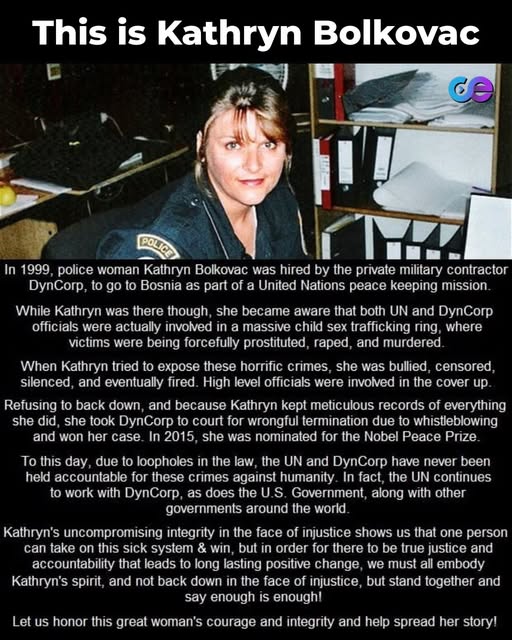
Another key PRE-EPSTEIN story. Katherine Bolkovac is a former police detective from Nebraska who became a human rights investigator after uncovering credible evidence of human trafficking and sexual exploitation committed by private security contractors working for the U.S. government in post-invasion Iraq.
She worked as an investigator for DynCorp International, a private U.S. military contractor, and documented cases in which women and girls were trafficked and sexually abused by people working under contract to the U.S. government. When she reported what she found, she faced resistance and was eventually fired. She successfully sued DynCorp for wrongful termination.
Bolkovac’s work became the subject of the book “The Whistleblower” and later a major motion picture of the same name starring Rachel Weisz, which dramatizes her fight to expose the exploitation and seek justice.
Dr. Berg on Plastic
I’ve been thinking about this a lot lately… The idea of “recycling” plastic is largely a scam designed to keep you buying plastic items.
Industry documents reveal there was never much hope for plastic recycling to be economically viable. Only about 9% of all plastics can even be recycled. The rest? It’s incinerated or sinks to the bottom of the ocean.
They knew if the public thought recycling was working, we wouldn’t be as concerned about it. This means the plastic industry intentionally misled us.
The real solution isn’t just about recycling, it’s about avoiding plastics altogether to protect the environment AND our health.
– Dr. Berg
Jan Zizka
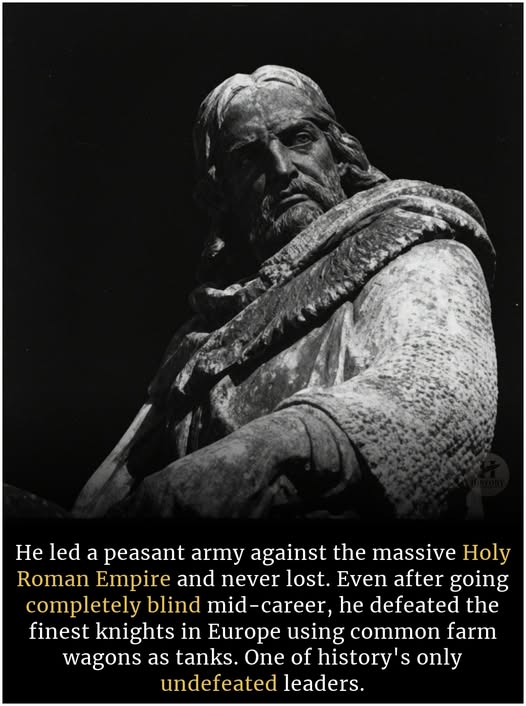
In 1420, the most powerful armies in Europe marched into Bohemia to crush a rebellion of simple farmers. The Pope had declared a Crusade against these people for the crime of wanting to read the Bible in their own language.
Jan Zizka was a minor noble with one eye and a deep sense of justice. He was nearly 60 years old when he took command of a ragtag force armed with little more than converted farm tools.
But the invaders did not realize they were facing a man who would rewrite the rules of war. Zizka saw that his peasants could not match the armored knights of the Holy Roman Empire in an open field.
He decided to turn their own farm wagons into weapons. He reinforced them with heavy timber and mounted small cannons inside them, creating the world’s first mobile tanks.
When the knights charged, they were met with a wall of steel and fire that they could not penetrate. The elite cavalry of Europe was decimated by men who had spent their lives behind a plow.
Then, tragedy struck. During a siege in 1421, an arrow hit Zizka in his only good eye. The legendary general was now completely blind.
Most men would have retired to a quiet life. But Zizka refused to abandon his people or his faith.
He continued to lead from the front, relying on his subordinates to describe the terrain and the enemy’s position. He could visualize the battlefield in his mind with perfect clarity.
He saw their courage. He saw their sacrifice. He saw their ultimate victory.
In 1422, while totally blind, he led a brilliant night attack at the Battle of Kutna Hora. He managed to break through a massive encirclement, outmaneuvering the finest generals of the age.
He fought in over 100 engagements and never lost a single major battle. Even as the darkness closed in on his physical sight, his tactical vision remained sharper than any king’s.
Jan Zizka died of the plague in 1424, leaving behind a nation that had successfully defended its right to worship God freely. He remains one of only a handful of generals in history to remain undefeated.
His legacy proved that conviction and innovation can overcome the greatest of odds.
Sources: Britannica / Military History Magazine
Quote of the Day
“More men have become great through practice than by nature.” – Democritus, Philosopher (460 – 370 BC)
Blake and Costner
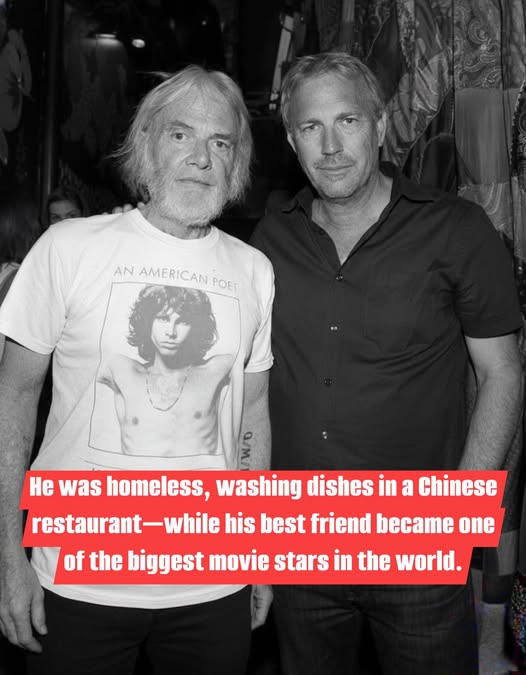
He was homeless, washing dishes in a Chinese restaurant—while his best friend became one of the biggest movie stars in the world.
That friend would later make a single decision that changed both their lives forever.
In the late 1970s, Michael Blake arrived in Hollywood with nothing but a typewriter and an unshakable belief that stories mattered. By 1981, he crossed paths with another struggling actor named Kevin Costner. No fame. No money. Just rejection letters and long days chasing auditions that went nowhere.
They were outsiders together. And that shared struggle welded them into friends.
In 1983, Blake wrote a small, scrappy film called Stacy’s Knights. Costner starred. The movie failed quietly. No buzz. No future.
Their friendship survived.
Then everything changed—except for Blake.
Kevin Costner’s career exploded. One role led to another. Suddenly, doors opened wherever he went. Instead of leaving his old friend behind, Costner tried to pull him forward. He set up meetings. He praised Blake’s talent. He put his own reputation on the line.
But every report came back the same.
“I sent him on a lot of jobs,” Costner later said,
“and every report that came back was that he pissed everybody off.”
Blake was brilliant—but difficult. Bitter. Angry. Rejection had hardened him. He blamed executives. Studios. The system. Everyone but himself.
Costner watched his friend self-destruct.
One afternoon, the frustration boiled over. Costner grabbed Blake and shoved him against a wall.
“Stop it!” he shouted.
“If you hate scripts so much, quit writing them!”
The moment shattered everything. It felt like the end.
A week later, Blake called.
He had nowhere to sleep.
Could he stay?
Costner said yes.
For nearly two months, Michael Blake lived on Kevin Costner’s couch. He read bedtime stories to Costner’s daughter. He stayed up late every night, pouring anger and heartbreak onto the page. Writing wasn’t just hope anymore—it was survival.
Eventually, the family needed space. Blake packed what little he owned and drove to Bisbee, Arizona.
There, far from Hollywood, he washed dishes in a Chinese restaurant for minimum wage. Some nights he slept in his car. Other nights on borrowed couches.
But every night, he wrote.
He carried a story he couldn’t let go of—about a lonely Civil War soldier who finds belonging among the Lakota Sioux. A Western—when Hollywood said Westerns were dead. Expansive—when studios demanded safe, small films. Risky—when executives feared anything different.
Costner and producer Jim Wilson believed in it. But they knew the truth.
No studio would touch it.
Their advice was simple:
Turn it into a novel first.
Blake did.
Thirty publishers rejected it.
Thirty.
Finally, in 1988, Fawcett released a modest paperback. The cover looked like a romance novel. When Blake asked about a second printing, he was told to write something else.
Costner never forgot the story.
When he finally read the book, he stayed up all night. He finished at sunrise and immediately called Blake.
“Michael,” he said,
“I’m going to make this into a movie.”
Costner paid $75,000 of his own money for the rights. He asked Blake to write the screenplay. He chose to direct—despite never directing before. And he would star in it himself.
Hollywood laughed.
They called it “Kevin’s Gate.”
A three-hour Western.
Subtitled Native dialogue.
A first-time director.
They predicted disaster.
Costner didn’t blink.
Filming lasted five brutal months in South Dakota—scorching heat, freezing cold, thousands of buffalo, hundreds of horses, live wolves. When the budget spiraled, Costner invested $3 million of his own money to finish the film.
On November 21, 1990, Dances with Wolves premiered.
Critics were stunned.
Audiences were moved.
The film earned $424 million worldwide—becoming the highest-grossing Western in history.
At the 63rd Academy Awards, it received twelve nominations.
It won seven.
Best Picture.
Best Director.
And Michael Blake—the man who once washed dishes and slept in his car—walked onto that stage in a tuxedo and accepted the Academy Award for Best Adapted Screenplay.
Years later, Costner said simply:
“We made the movie. And Michael won the Academy Award.”
Michael Blake died in 2015. His novel sold millions. Dances with Wolves was preserved in the National Film Registry by the Library of Congress.
But his real legacy isn’t the Oscar.
Or the box office.
It’s this:
He was rejected for years.
He burned bridges.
He hit rock bottom while his friend soared.
And he never stopped writing.
Dreams aren’t secured by perfect timing or easy applause.
Sometimes the difference between those who make it and those who don’t isn’t talent.
Sometimes it’s just refusing to quit.
Edgar McGregor
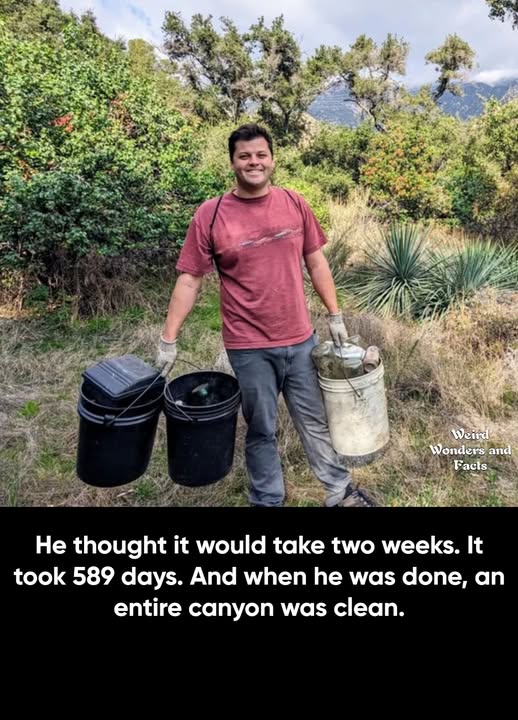
He thought it would take two weeks. It took 589 days. And when he was done, an entire canyon was clean.
In May 2019, a twenty-year-old climate activist named Edgar McGregor walked into Eaton Canyon, one of the most popular hiking spots in Los Angeles County, carrying two things: a five-gallon bucket and a pair of gloves.
What he saw stopped him cold. Trash was everywhere. Beer cans. Plastic bottles. Old phones. Lighters. Disposable masks. Car tires. At one point, he would even find a ten-foot-tall patio heater abandoned in the wilderness. Eaton Canyon sat within the Angeles National Forest, drew over 600,000 visitors a year, and had become a dumping ground that no one was taking responsibility for.
Edgar figured he could clean it up in ten to twenty days. Maybe a few sunny weekends. Grab what he could, fill some bags, and move on.
He could not have been more wrong.
The trash just kept appearing. Every trail, every waterfall, every storm drain, every streambed had layers of waste that had been accumulating for years. Edgar quickly realized that a few weekend trips were not going to fix this. If he wanted the canyon clean, he would have to come back every single day.
So that is exactly what he did.
For 589 consecutive days, Edgar McGregor hiked into Eaton Canyon with his buckets and gloves. He went when it was 117 degrees. He went in thunderstorms. He went through snow. He went when wildfire ash was falling from the sky and the hills around him were burning. He went during the pandemic, when the trails were closed to most visitors but the trash remained. He went after work, sometimes for an hour, sometimes for four. He never took a day off.
Over nearly two years, he estimates he picked up between 12,000 and 15,000 pounds of trash. On his biggest single day, he filled an entire dumpster by himself — roughly half a ton of waste pulled out of a place that was supposed to be a nature preserve.
Edgar, who has been open about being autistic, found a rhythm in the work that suited him. He was methodical. He would pick a specific location each day — a particular stretch of trail, a waterfall basin, a storm drain — and search it thoroughly until it was spotless. Then he would move on to the next section. He tracked which areas stayed clean and which ones attracted repeat dumping. He carried two buckets — one for trash, one for recyclables. The recyclables he turned in for cash and donated every cent: some to planting native western sycamore trees in the park, some to climate charities, some to political candidates who pledged to act on environmental policy. Over time, he donated more than four hundred dollars from aluminum cans and plastic bottles that other people had thrown on the ground.
Part of what motivated him was the 2028 Summer Olympics. Los Angeles had won the bid to host the games, and Edgar could not stand the thought of world-class athletes visiting his city’s trails and seeing trash everywhere. He called it a potential “global embarrassment.“ He wanted the canyon to be something Los Angeles could be proud of.
As his streak grew longer, Edgar documented everything on social media with the hashtag #EarthCleanUp. He posted photos of the most extreme conditions he cleaned in. He shared before-and-after shots of sections of trail. He never made it about outrage toward litterers — he had learned early on that anger was counterproductive. “There’s always going to be litterbugs,“ he said. “There’s nothing we can do to stop people from throwing stuff onto the ground.“ Instead, he focused on the joy he found in the work. The animals that started returning. The trails that looked the way they were supposed to. The strangers who saw him out there and grabbed their own buckets.
On March 5, 2021, something remarkable happened. Edgar walked aimlessly around the southern half of the park for four hours, checking every location he could find. He only filled two buckets. The next day, the same thing happened in the northern half. He had checked the entire main trail, all the waterfalls, all the storm drains. There was nothing left to pick up.
For the first time in 589 days, Eaton Canyon was completely free of municipal waste.
Edgar posted a video to Twitter, barely able to contain his excitement. “I AM DONE!!! I DID IT!!!“ he wrote. The post exploded. Over a hundred thousand people liked it. Thousands commented. Fellow climate activist Greta Thunberg responded: “Well done and congratulations!!“ California’s first Latino U.S. Senator, Alex Padilla, called him a “hometown hero.“ People from Australia, Norway, India, and dozens of other countries sent photos of themselves cleaning up their own local parks, inspired by a twenty-year-old in Los Angeles who had simply refused to stop.
But Edgar did not stop either.
He returned to Eaton Canyon two to three times a week for maintenance and set his sights on other parks that needed the same attention. As of 2022, he had passed 1,000 consecutive days of cleanup. He enrolled at San Jose State University to study meteorology and climatology, determined to turn his passion for the planet into a career.
“Climate action is a group project,“ Edgar wrote. “There will be no hero that will emerge from the fog to save us from ourselves. To preserve this planet, we’ll need a billion climate activists.“
He is not wrong. But the truth Edgar McGregor proved is equally important: you do not need a billion people to start. You need one person, one bucket, and the willingness to show up tomorrow, and the day after that, and the day after that, for as long as it takes.
One young man. One canyon. 589 days. Fifteen thousand pounds of trash. And a simple lesson the whole world needed to hear: the mess is never too big if you just keep showing up.
Purple Heart Distress Signal
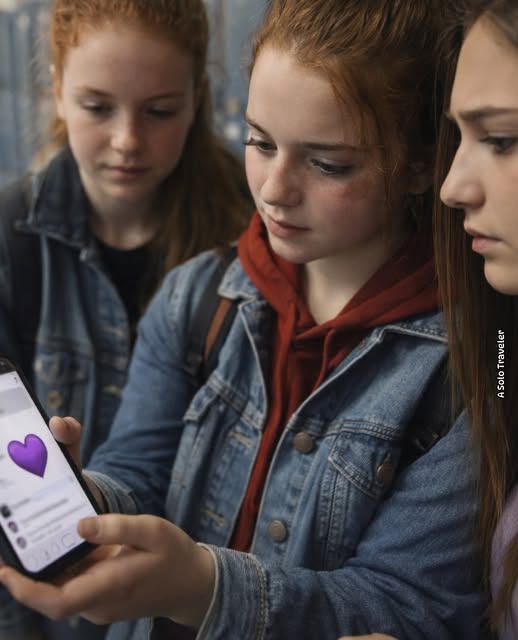
My fifteen-year-old daughter came home last Tuesday with a black eye.
Not from a fight.
Not from sports.
From stepping between her best friend and a boy who thought he owned her.
It happened at the school dance.
Emma had been trying to break up with him for weeks.
He wouldn’t let her.
He texted constantly.
Showed up uninvited.
Threatened to spread rumors.
Threatened to hurt himself.
At the dance, when Emma told him it was over, he shoved her.
My daughter stepped in.
He swung.
And that’s how she came home bruised.
I was ready to call the police.
Ready to march to his house.
But my daughter grabbed my arm.
“Mom. Wait. That’s not the important part.”
She opened her phone.
There was a group chat called: Exit Plan.
Forty-three girls.
Same high school.
Same purpose.
How to leave safely when you’re dating someone who scares you.
I scrolled.
“My boyfriend checks my phone. How do I delete messages without him knowing?”
“He follows me home. I can’t break up with him alone.”
“My parents love him. They won’t believe me.”
These weren’t dramatic teenagers.
They were fifteen and sixteen-year-old girls sharing survival strategies like field operatives.
They had protocols.
If you needed help, you dropped a purple heart emoji.
Within minutes, girls showed up.
They walked you home.
Sat next to you in class.
Created a physical buffer in hallways.
They tracked locations.
Saved screenshots.
Had code words.
They built a safety network because they didn’t trust adults to protect them.
“Why didn’t you tell a teacher?” I asked.
“A counselor? A parent?”
She looked at me gently.
“Mom… adults always say the same things. ’Just break up.’ ’Ignore him.’ ’He’s immature.’”
Then she said something that stopped me cold:
“They know where we live. They know our schedules. They have our pictures. We can’t just walk away.”
Emma’s parents listened after the black eye.
The boy was suspended.
Emma is staying with her aunt in another district until things calm down.
But here’s what I can’t stop thinking about:
Forty-three girls.
One school.
All convinced that depending on adults would fail them.
How many of them tried telling someone first?
How many were dismissed as “dramatic”?
“Overreacting”?
“Too sensitive”?
My daughter’s bruise faded in a week.
But I can’t unsee that group chat.
I can’t unknow that our daughters are quietly building emergency systems because they believe ours don’t work.
I am not writing this to glorify teenage resilience.
They should not have to be this strategic.
They should not have to think like crisis managers at fifteen.
If a young person tells you someone makes them uncomfortable—
Believe them.
Immediately.
Don’t minimize it.
Don’t rationalize it.
Don’t wait for proof.
Because by the time there’s a black eye…
They’ve already been handling it alone for far too long.
If this moved you, share it.
Someone out there needs an adult who listens the first time.
(Tom: The members of an uptone, ethical, productive group do not tolerate, justify or make excuses for unethical behaviour. They recognise and call it for what it is. And handle it. Those who minimise, justify or defend unethical behaviour are somehow in agreement with it and have their own scene to handle.
And you thought I was talking about kids at school?)
Something Big Is Happening
By Matt Shumer • Feb 9, 2026
Charles Boycott
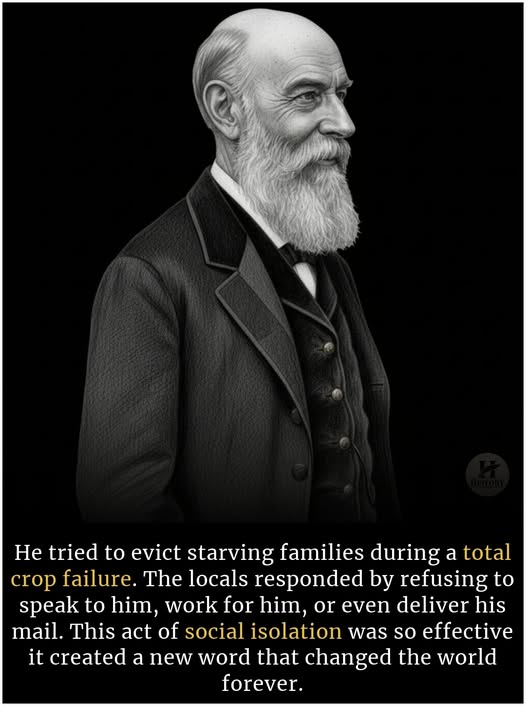
In 1880, a wealthy British land agent named Charles Boycott lived on a sprawling estate in County Mayo, Ireland. He was an uncompromising man who managed lands for an absentee lord.
A terrible harvest had left the local farmers starving and unable to pay their full rent. They didn’t ask for a handout. They simply asked for a 25 percent reduction to survive the winter.
But Charles Boycott was not a man of compromise. He refused their pleas and began the process of eviction to throw families out of their homes.
He expected the peasants to fold under his authority. He expected them to fear the law he represented.
But the people of Ireland had found a new champion in the Land League. Their leader, Charles Parnell, had proposed a different kind of warfare.
Instead of violence, Parnell suggested a policy of total social isolation. He told the people to treat an unfair landlord like a leper of old.
When Boycott tried to hire local workers to harvest his crops, nobody showed up. The fields sat heavy with overripe grain, rotting in the Irish rain.
He walked into the local shops to buy supplies, but the shopkeepers turned their backs. They would not take his gold.
He sent for his mail, but the postman refused to deliver it. His servants walked out of his house without a word, leaving him to cook his own meals.
He saw their resolve. He saw their silence. He saw their power.
But the British government stepped in to assist him. They sent 50 orange-men from the north and 1,000 soldiers to protect them while they harvested the crops.
It cost the government over 10,000 pounds to harvest a crop worth only 350 pounds. The victory was hollow.
Charles Boycott was a broken man. By December of that year, he fled Ireland in a carriage protected by a military escort.
His name was no longer just a name. It had become a verb that described the most powerful non-violent weapon in history.
Today, we still use his name whenever a community stands together to stop unfair practices. Collective action remains the strongest check on unbridled power.
Sources: Britannica / National Library of Ireland / History Channel
